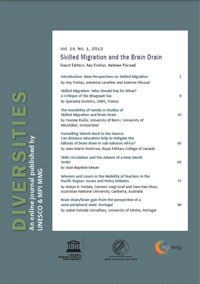Funnelling Talents Back to the Source: Can distance education help to mitigate the fallouts of brain drain in sub-Saharan Africa?
by Jean-Marie Muhirwa (Royal Military College of Canada)
To cite this article: Muhirwa, J.-M. (2012). Funnelling Talents Back to the Source: Can distance education help to mitigate the fallouts of brain drain in sub-Saharan Africa? Diversities, 14(1), 45–62. https://doi.org/10.58002/743q-g982
This paper offers a critical reflection on theories supporting the positive consequences of brain drain (BD) in sub-Saharan Africa (SSA). It sides with the sceptics of the power of remittances alone to offset the bleed of highly skilled professionals and foster the development of SSA. It is argued that given the intensification of BD’s pull and push factors, stemming or reversing it will become even more difficult than it has been so far. Distance education (DE) is deemed to hold the potential to help tap into the BD pool of expertise and funnel it back home to contribute to the reconstruction of crumbling higher education (HE) systems in SSA. This brain circulation (BC) effort added to some benefits from remittances would help to alleviate the crippling effects of BD in SSA while, at the same time, allowing the majority of under-employed highly qualified migrants to stay current in their areas of expertise. Learning from DE past mistakes in SSA would foster the emergence of a more ecological DE approach that would foster more sustainable BC and thus mitigate the fallouts of BD.
Keywords: brain drain, brain waste, sub-Saharan Africa, remittances, distance education, higher education
|
